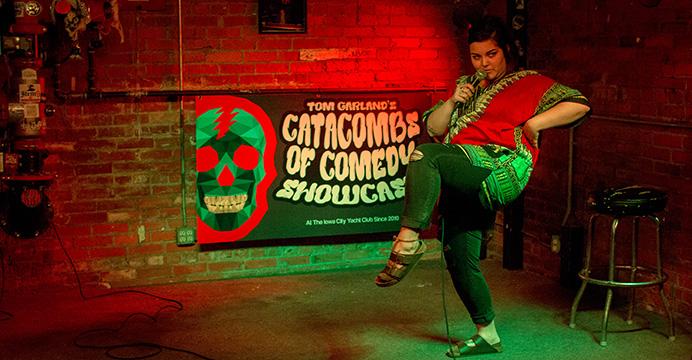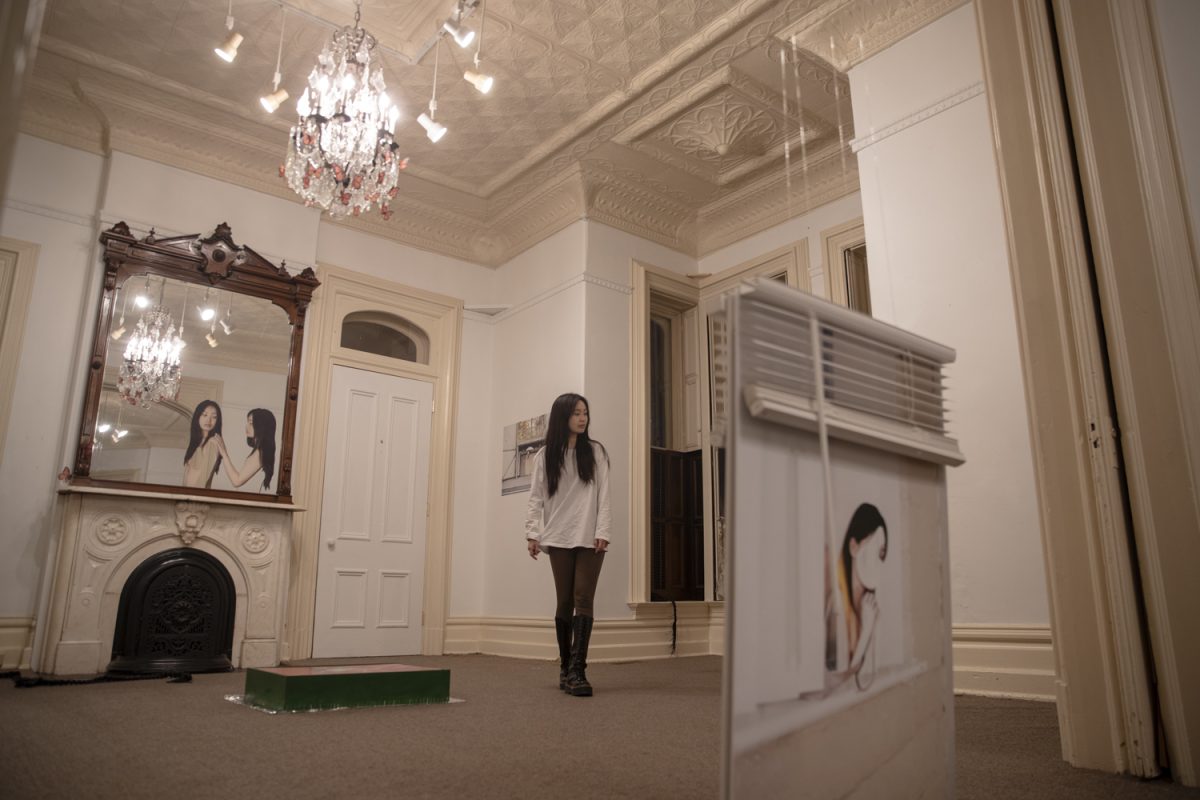By Conor McBrien
Comedy can be tough.
It forces performers to be creatures of the night. They work in spotlights in the center of dim rooms. Their habitats are basements, bars, and theaters But this artform is slowly leaving the underground, and Iowa City is in the midst of a comedy renaissance. Local venues have added more comedy options for late-night entertainment.
It takes bravery as well as audacity to be a part of this renaissance — to self-deprecate, vent, and open themselves up to the crowd.
Initially, that drive comes with high risks and low rewards. This is true in all forms of art but especially so in comedy. Whether it’s the stray chuckle in the otherwise tough crowd or simply the five nerve-racking minutes afforded to them at the microphone, comedians starting out are seldom paid in anything but stress and embarrassment.
• • •
“Five years ago, Iowa City was laughter-free.”
Tom Garland — one of the most prominent local comics and one who tours frequently — laid out this scenario without a hint of theatrics, despite how outright wrecked the scene was in retrospect.
Penguins Comedy Club in Cedar Rapids — one of the centers of area comedy — had been hit badly by the 2008 flood and closed for a while as a result. Iowa City’s comedy was nascent then, perhaps nowhere near conception yet.
Garland described a time when his weekly show, the Catacombs of Comedy, had little to do with comedy. As he described it, Catacombs was more of an open-mike variety show; featuring such acts as poetry, belly-dancing, and body suspension. Comedy came into play sporadically and eventually evolved into Tom Garland’s Catacombs of Comedy Showcase.
In the midst of that flood, expectant comedy fans might have been too distracted pumping water or stacking sandbags to predict how rewarded they would be when the comedy scene expanded a few short years later. By fall 2014, the community had accumulated two weekly comedy shows, a biweekly show, and a monthly one, plus a powerful trinity of improvisational comedy groups.
With the stage now set, questions remain: Will interested parties find their place in the local comedy community? Will the community find a definitive voice to call its own?
• • •
Revolutions happen in basements. Ben Kasl discusses this historical point with the crowd gathered in the Secret Basement venue under 610 E. Jefferson St.
There, in one of a couple Secret Basements, is a warm, comfortable space. The back wall isn’t brick; instead it looks like the jagged face of a mountainside, giving the décor a gated-community flavor. Unlike most gated communities, this is one that encourages new blood.
Tall and charismatic, Kasl takes the carpet “stage,” often leaving the mike stand a foot higher than the heads of some comedians that follow his introductions.
Kasl is joined by fellow members of Paperback Rhino, folks from a local improv group, the Great White Narcs, talent from the Little Village Comedy Hour, a couple from Catacombs, and a hodgepodge of others. Everyone seems at ease in these surroundings compared with their usual venues; the space is small and intimate. In essence, the crowd is mainly filled with comedians and occasional outsiders to the comedy world interspersed among them.
If Iowa City had a comedy workshop, this would be the place to start it. There isn’t much seating, but the cover charge is cheap, and the performers are enthusiastic regardless of experience. The cowardly lions that are intimidated by the common bar crowds can find solace here, unless they want experience in the depths of the harsh, real world.
• • •
The actual, gritty business of comedy seems to begin at Catacombs. “[Standup comedy] is a good job if you treat it as a real job,” Garland said.
When a person starts to enter the world of comedy, Garland’s advice is pretty typical and fits for most professions: Make the best use of time allotted and do the best work possible. “Do your set sober,” he noted.
First comes experience. One of the best places to get experience is in the trenches, or in this case, the Catacombs on Monday nights.
“This is the gym,” as producer and regular host Doug “DJ Dorrington” of the show describes it later when the room has cleared around 2 a.m.
Similar to weightlifting, there is pain before gain. Garland and Dorrington both describe the Yacht Club, where Catacombs takes place, as filled with a “wild crowd” of patrons. On some nights, this might be manifest in tables either filled with drunk or heckling audience members. Comedians such as Garland and Dorrington honed their skills at working the crowd. Whether the performer-audience relationship is on the precipice of breaking down and attention spans are shrinking, the sets become more conversational in tone. This usually happens as the night goes on. After midnight, the performer must plead with the restless handful of night owls who remain just to take a seat in the first two rows.
Save for the stage, the room is dim from the illumination of a hundred off-season, multicolored Christmas lights. The stage is barely a half-foot high and so shallow it takes two steps back from the edge to bump into the back wall.
Thankfully, the stage is wide enough for improvisation. This is a blessing for visiting bands such as the Olympics, whose members need to cram several people plus equipment onto the modest platform.
It fits the pacing comedian well, too. Some stick to the special corner by the adjacent wall, where they can make friends with the handy barstool that functions as a cup holder and comfortable crutch to deal with potentially insufferable tension.
Many of the upcoming comics take seats to calm their nerves with a brew or study their handwritten notes beneath more Yuletide near-darkness. Some haunt the bar in the back.
The performance anxiety they feel before their time onstage is compounded by acts from dedicated such comics as Dorrington and Daniel Yoo, who slay the bus stop’s worth of people with their material. Garland gives them the light, a common signal most working comics know as a sign their time is almost up. Many end on corny one-liners or truncated anecdotes.
The night goes on.
• • •
A combination of both arenas — Catacombs and the Secret Basement — is found in the Little VillageComedy Hour. Held every other Saturday, typically at High Ground Café, it features some of the best talent Iowa City has to offer. It is a show for comics more seasoned than those in Catacombs, but there is some overlap in each venue’s talent. Cohosts Robert Flanagan and Arashdeep Singh are princes of puns and barons of self-deprecation who present a melting pot of local talent. Though the show is free, a donation is suggested to keep this valuable variety show running. Little VillageComedy Hour is at least worth a few bucks to see what Singh in particular will bring.
One show featured Singh putting on a huge wig and strutting around the Mill, impersonating comedian Reggie Watts. The crowd watched him move around the room in stunned silence as music blasted behind him.
Then, at the edge of the stage, he stopped.
“And that, ladies and gentlemen, is experimental comedy,” he said to all gathered.
• • •
Iowa City, being a college town, is no better place to be experimental and expressive. The tricky part is learning to express oneself without setting things on fire. This leaves ambitious, creative people ample room to engage themselves and their potential audiences with their work.
If one also seeks engagement with other performers experimenting with comedy, the local improvisational comedy groups are worth checking out, too. Unlike the open-door policy often found in standup, auditioning is a key part of joining in.
Iowa City improv features Paperback Rhino, the Great White Narcs, and the Janice Ian Experience. All of the current these groups are filled to the brim with talented, young folks suited to the spontaneous world of improv. Many of them are college students. In Paperback Rhino, only a few members are theater majors.
Paperback Rhino in particular is becoming increasingly popular, with recent booking offers pouring in.
“Growth has been unexpected and exponential,” Sirena Lindsay, current cocaptain of Paperback Rhino, said.
The popularity of “Whose Line Is It AnyWway?” and the legendary Second City improv enterprise have given the art deserved attention in the mainstream, so it behooves any interested parties to see the local groups.
Joining a troupe doesn’t restrict a person to one world. Even if one joins an improv troupe, there’s always standup that could be done on the side. For example, in addition to Paperback Rhino’s Ben Kasl killing it at the microphone, Narcs members Jeff Lehman and Pete Baldwin have proven themselves to be funny, consistent, and well-established figures in local standup as well.
• • •
Comedy can be emotionally trying for a performer. It’s a cycle of nervousness, awkward tension, and a few well-received jokes. Sometimes, the sad clown is funny; sometimes the sad clown is just, well, sad.
“Just the act of taking the stage and grabbing a mike is an audacious act,” said Megan Gogerty, a comedian, playwright, and a UI lecturer in theater.
Even though there are various local routes open to the aspiring comic, the drive to be on the stage overwhelms the terrifying joke that sounded better in the comedian’s head.
There will always be a second shot at the microphone, though. The bad night onstage can even become the material for a good set down the line. As with any art, no one starts off with a masterpiece.
“When you do well, that’s when you get high for days,” Flanagan of Little Village Comedy Hour said. “But if you do poorly, or even not as well as you wanted to, then you feel terrible. But hopefully, you do better next time.”
Writer’s Picks
1. Jeff Lehman appears to be a poster child for clinical depression, but his kind voice and handsome face makes him seem charming in a melancholic, Woody Allen kind of way. The adage “comedy is tragedy plus time” is applicable here, but Lehman somehow transmutes more comedy out of his time. One of the Great White Narcs, his sad-clown humor will carry him a long way.
2. Daniel Yoo is mastering the one-liner style of comedy. On stage, he seems awkward and ill-prepared, but this is hilariously human in its own right. Like the late, great Mitch Hedberg, his nervousness and out-there manner are boons to his solid comedy. He is without a doubt one of the funniest comedians in Iowa by sheer virtue of existing. Hopefully, that last sentence sounds like a compliment.
3. Arashdeep Singh and Robert Flanagan are the cohosts of Little Village Comedy Hour. Both are becoming well-established fixtures in Iowa City’s growing comedy scene despite their busy schedules.
Flanagan recently won Last Comic Standing at the IMU and excels as an Honors student. Singh’s experimental comedy consistently brings interesting material to each show; he serves as an editor ofLittle Village.
4. Paperback Rhino is one of Iowa’s strongest comedic forces. It is a masterful, charismatic improv comedy troupe that never disappoints audiences. Arguably one the high points of both this year’s Green Gravel Comedy Festival and Floodwater Comedy Festival, the current incarnation of the group is full of talented young folks, all with bright futures in comedy.
5. Megan Gogerty is a UI lecturer in theater and an accomplished playwright. She is the wise Captain Picard to local comedy’s starship Enterprise. A teacher of Robert Flanagan and others active in the community, her background in theater feeds her strength and confidence onstage. Currently, she performs her new show, Housebroken, at Riverside Theater through April 26. Be sure to catch it this weekend.







